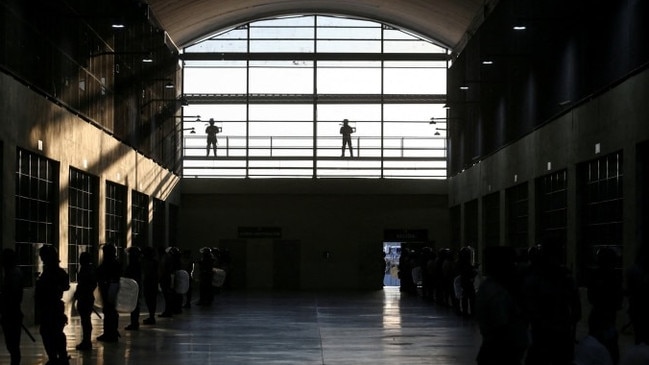US Supreme Court issues new halt on Trump deportations under wartime law
US justices say the administration can’t use the Alien Enemies Act to expel migrants while litigation continues.

The US Supreme Court for a second time barred the Trump administration from using an 18th-century wartime law to remove a group of Venezuelan migrants that authorities claim belong to a transnational gang, stepping in after lower courts declined to stop the migrants’ imminent deportation to an El Salvador prison.
While the court usually says little when ruling on emergency matters, Friday’s unsigned opinion made clear the justices’ growing frustration with White House efforts to expedite deportations by bypassing migrants’ constitutional rights to a hearing before they can be removed.
The opinion cited the government’s resistance to the court’s ruling in a separate deportation case, in which the justices ordered the administration to facilitate the return of Kilmar Abrego Garcia, a migrant mistakenly sent to the El Salvador prison, known as Cecot.

“The government has represented elsewhere that it is unable to provide for the return of an individual deported in error to a prison in El Salvador, where it is alleged that detainees face indefinite detention,” the opinion said.
Facing a similar fate, the Venezuelan “detainees’ interests at stake are accordingly particularly weighty,” the justices said.
Justice Samuel Alito, joined by Justice Clarence Thomas, dissented. He argued that the Supreme Court lacked authority to intervene in lower-court proceedings at this stage.
Last month, the justices temporarily blocked the removals so lower courts could consider the migrants’ arguments, including that Trump improperly invoked the Alien Enemies Act.
Friday’s opinion said the administration’s response to the court’s earlier order regarding the Alien Enemies Act “surely does not pass muster”.
Detainees were given notices “roughly 24 hours before removal, devoid of information about how to exercise due process rights to contest that removal,” the court said.
The administration remained free to deport the migrants through normal immigration procedures, the order added.
Trump, in a social media post, said that process could take “many years for each person, and one that will allow these people to commit many crimes before they even see the inside of a courthouse.”
“This is a bad and dangerous day for America!” he wrote.
Lee Gelernt, an American Civil Liberties Union lawyer representing the migrants, said the court “correctly put a pause on the extraordinary use of a wartime authority until it could fully consider the case. For now, this means that no more individuals can be hurried away to a brutal foreign prison,” he said.
Precedents dating back more than a century have made clear that migrants are entitled to due process before being deported, the court said, to prevent “the mistaken or unjustified deprivation of life, liberty, or property.”
Friday’s opinion suggested that the district judge overseeing the migrants’ case, James Wesley Hendrix, had failed to appreciate the legal stakes. Even as the government prepared to remove the migrants on April 18 without providing them necessary notice and opportunity to respond, Hendrix, a Trump appointee in the Lubbock, Texas, courthouse, did nothing, the court said.
Hendrix’s inaction for more than 14 hours after the migrants’ lawyers filed for relief “had the practical effect of refusing an injunction to detainees facing an imminent threat of severe, irreparable harm,” the justices said.
The Supreme Court stressed that it was deciding neither whether the Alien Enemies Act could be used against the migrants nor the exact form of hearings that must be held for detainees contesting removal.
Instead, the justices directed the Fifth US Circuit Court of Appeals, in New Orleans, to hold proceedings to determine “the precise process necessary to satisfy the Constitution in this case.” The justices added that they “recognise the significance of the Government’s national security interests,” and therefore “lower courts should address AEA cases expeditiously.” Separate proceedings in Abrego Garcia’s case took place Friday in Maryland, where a federal judge raised concerns with the Trump administration’s lack of answers about steps it is taking to comply with court orders requiring the government to facilitate his return.
Judge Paula Xinis said transcripts of closed-door questioning of Trump administration officials showed that “what we got is a bunch of ‘I don’t knows.’” “Each of those depositions, to varying degrees, were an exercise in utter frustration,” Xinis said.
A Justice Department lawyer said the Salvadoran government recently reported that Abrego Garcia is in good health at a penitentiary in the city of Santa Ana and has gained weight.
Dow Jones Newswires






To join the conversation, please log in. Don't have an account? Register
Join the conversation, you are commenting as Logout